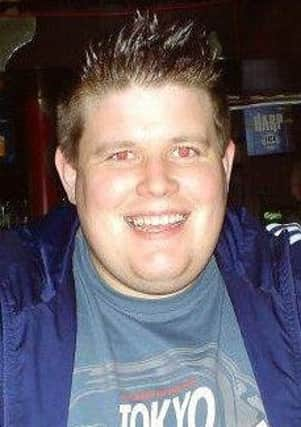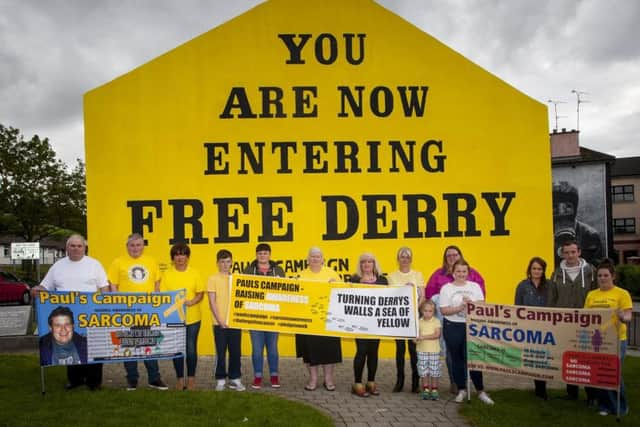Sarcoma: Paul's Campaign is aiming to raise awareness of the '˜forgotten cancer'


Sarcomas are rare malignant tumours that arise from transformed cells of the connective tissues such as muscle, fat, cartilage or bone. Around 80 per cent arise in soft tissue and 60 per occur in the lower limbs, although they can affect any part of the body. They are more common in children and young adults and In Ireland between 200-250 adults are diagnosed with some form of sarcoma each year.
The relative rarity of the condition has seen sarcoma sometimes referred to as the ‘forgotten cancer’.
Advertisement
Hide AdAdvertisement
Hide AdSince Paul Coyle’s death, his father Francie has been at the forefront of ‘Paul’s Campaign’ in order to highlight awareness of the condition and impress upon all concerned the vital need for early detection and diagnosis.


Francie Coyle relates that when his son, an avid rugby player, first visited the doctor’s complaining of a lump the condition was diagnosed as a sports injury. By the time the sarcoma was detected it was unfortunately too late.
The problem is that in the early stages soft tissue sarcomas often do not present symptoms. The lump can at first be painless but pain will come as the lump grows and presses against nerves and muscles. It is the stage between these stages that becomes vital in terms of detection.
Diagnosing sarcoma can be challenging because of its rarity and for instance a GP might only meet someone with a sarcoma once in their working lifetime.
Advertisement
Hide AdAdvertisement
Hide Ad“The reason for this campaign is to try to not let this happen to anyone else as that was a wish of Paul’s before he passed away. We are pushing for more public awareness through the primary care system and for funding for research into the condition,” said Francie.


One difficulty within Northern Ireland is the lack of a multi-disciplinary cancer treatment centre with to provide x-rays, ultra-sounds and biopsies for treatment of the condition. With only two sarcoma specialists covering Northern Ireland it is often the case that sufferers have to make the 150 mile trip to Dublin for treatment.
A 5cm lump proven to be a sarcoma is eminently treatable, but if it grows undetected to around 13cm then it is classed as a Stage 4 tumour and the odds of survival are rapidly slashed.
Francie Coyle said: “It’s about breaking down the barriers about the type and range of sarcoma. It’s a disease that is out there and requires treatment.”
Advertisement
Hide AdAdvertisement
Hide AdWhilst many events have taken place in recent years for ‘Paul’s Campaign’ in Derry, including walks around the city walls wearing bright yellow t-shirts highlighting the cause and even having Free Derry Corner emblazoned in the same distinctive colour, the idea of course is to spread awareness as widely as possible.
It was to that end last week that ‘Paul’s Campaign’ arrived at Stormont for an event aimed at promoting awareness and examine channels of how that can be best achieved.
The event was hosted by Sinn MLA Maeve McLaughlin who is Chair of the Assembly’s Health Committee.
“I never knew what sarcoma was until Paul passed away. And, that of course is the issue.
Advertisement
Hide AdAdvertisement
Hide Ad“There is a very basic issue about awareness and of course it was one of Paul’s last wishes that there was a campaign to raise awareness of the condition. We had Dr Charles Gillham, a cancer specialist from St Luke’s Hospital in Dublin at the event. He has long highlighted the need for specialist centres and he has attended events I have organised for ‘Paul’s Campaign’ in Derry as well.
“We had representatives there from the College of GP’s, the Patient and Client Council and the British Medical Association. For example one of the GP’s who spoke was from Bangor had a relative who died of sarcoma and the speaker from the Patient and Client Council also had someone belonging to them that died from it.
“So, the first two speakers had been directly affected and when you look at it like that the reality of it became very stark. There is a real need to get more information out there and a real need for GP’s to be given the training and resources to make early diagnosis which I believe is not always the case. But, all in all it was a very useful event,” she said.
Dr Charles Gillham is working with the National Cancer Control Programme in Dublin to develop a large multidisciplinary centre.
Advertisement
Hide AdAdvertisement
Hide Ad“The commonest cause of a lump is not sarcoma; this is a very unusual diagnosis. Lumps are much more frequently benign, but the sort of thing we would want brought to the attention of a GP is an enlarging lump, particularly if it is causing pain and particularly if it is over 5cm.
“If it is caught at a stage where it is confined to one area and it is operable, the prognosis is generally good, the chance of survival and cure relatively high. If a sarcoma isn’t diagnosed before it’s travelled it is generally incurable, so early diagnosis, as for all cancers, is very important.”
Paul Coyle’s father Francie told the ‘Journal’: There needs to be a set of general guidelines established as early detection is vital. It is tough, but we are getting the word out.”